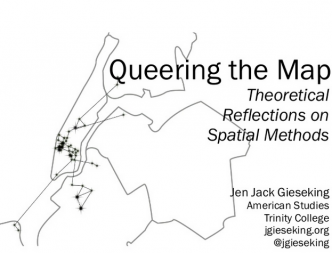CFP Mapping Desire – 25 years on: legacies, lessons, and lacunae (May & Sep 2020)
This is a call for papers (CFP) for CFP Mapping Desire – 25 years on: legacies, lessons, and lacunae (May & Sep …
This is a call for papers (CFP) for CFP Mapping Desire – 25 years on: legacies, lessons, and lacunae (May & Sep …
WOOHOO! The LGBTQ America: A Theme Study of Lesbian, Gay, Bisexual, Transgender, and Queer History theme study has been released by the …
48 (3): 262–70. A year and two weeks ago, I posted the text of “Crossing Over into Territories of the Body: Urban …
I’m thrilled my new chapter, “Dyked New York: The Space between Geographical Imagination and Materialization of Lesbian–Queer Bars and Neighbourhoods,” is out …
This spring I taught two incredibly exciting courses. The senior seminar, Queer America, was comprised of a small group of students, primarily …
I am honored to share that insights from my research were heard around the world for two minutes on August 23rd, 2016, …
For about two years, I’ve been collecting data on the use of the #ftm hashtag and, for a shorter time, #mtf hashtag …
The American Association of Geographers and Sexuality & Space Pre-Conference meetings took place in San Francisco last week. I’ve been back in …
I’m in NYC again, walking around among the places where it seems everyone I knew over the last 16 years in this …

My slides from my Futures Initiative talk, “Queering the Map: Theoretical Reflections on Spatial Methods,” at the CUNY Graduate Center this Friday …
I’m over the moon that 1) I do not have the flu as I did last February when I had to cancel …
Many thanks to the ridiculously smart and cool Nicole Pasulka for including my work in her Vice piece from August of 2015, …
In the last month while moving to Hartford and getting settled in my new office at Trinity, I am happy to share …
My short reflection piece, “Urban Margins on the Move: Rethinking LGBTQ Inclusion by Queering the Place of the Gayborhood,” is now out …
I am delighted to announce the publication of “Useful Instability: the Queer Social and Spatial Production of the Lesbian Herstory Archives” in …
I am delighted to share that I am Assistant Professor of Public Humanities in the American Studies Program at Trinity College as …
Although I add readings to my Gender, Sexuality, and Space Reading List about every six months, it’s been a few years since …
In the spring of 2013, I taught Queer(ing) New York as a Seminar in the City course with the Center for Lesbian …
This session brings together compelling scholars within diverse intellectual traditions in educational research to discuss corresponding and sometimes competing definitions of justice. Each panelist will respond to a set of questions designed to reveal the salient points of convergence and difference between Indigenous studies, critical disabilities studies, critical race studies, immigration and border studies, and queer studies in education. A noted critical discussant will synthesize perspectives, offer ideas for future inquiry, and prompt further discussion between the panelists.
Today is Equal Pay Day, a day I much admire because it is 1/365th of the reminder we need as a society …